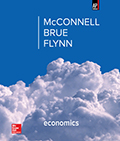Economics (McConnell), AP* Edition, 20th EditionChapter 8:
Behavioral Economics After studying this chapter, you should be able to: LO 8.1 | Define behavioral economics and explain how it contrasts with neoclassical economics. | LO 8.2 | Discuss the evidence for the brain being modular, computationally restricted, reliant on heuristics, and prone to various forms of cognitive error. | LO 8.3 | Relate how prospect theory helps to explain many consumer behaviors, including framing effects, mental accounting, anchoring, loss aversion, and the endowment effect. | LO 8.4 |
Describe how time inconsistency and myopia cause people to make suboptimal long-run decisions. | LO 8.5 | Define fairness and give examples of how it affects behavior in the economy and in the dictator and ultimatum games. |
 | 




